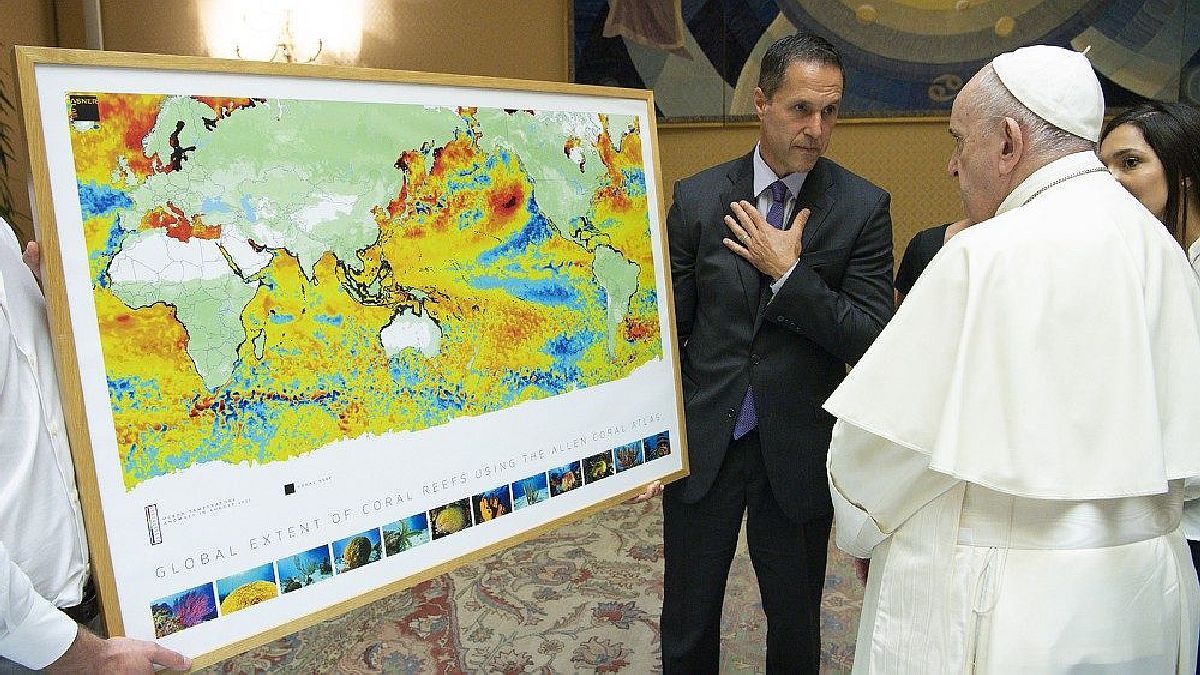1. A simple and forceful structure
It is not that complicated to approach reading this new pontifical document, which clearly aims to mobilize and generate a proactive reaction in the face of an increasingly gloomy panorama. The letter is like a “cry” of warning in the face of a reality that cannot be hidden. It is not just another text. It is a living word, a prophetic word, that stimulates and attempts to awaken the conscience of a lethargic humanity.
Regarding its outline, the beginning and end of the text present a correlation worth highlighting. The first words of the Exhortation are “Let all his creatures praise God.” (LD 1). This reference to San Francisco de Asis It places us before the value and power that praise has to place us in the appropriate space and to recognize the place that corresponds to God. Praise positions us in the appropriate place and reminds us that we are creatures. And that the attempt to take over, to occupy the place of the Creator, ends up ruining his project of love and salvation. Or put another way, it ends up ruining us. It is no coincidence that the last sentence of the papal writing says “”Praise God” is the name of this letter. Because a human being who tries to take the place of God becomes the worst danger for himself.”. (LD 73). Thus, in a kind of “inclusion”, praise and commitment run through the pontifical message.
Then, the titles show us the most urgent issues to consider and they can be checked in the text itself. They concentrate above all on the observation of reality, leaving the final chapters for a very specific warning about the COP28 and a fundamental reference to the spirituality that should sustain these commitments.
As we can see, a simple scheme, which calls for greater honesty in the view and discernment of the situation, a call for sustainable and effective agreements, and to close, a call to the mystique of care, so necessary and urgent in these circumstances.
2. Some relevant concepts
If we approach the document from a thematic perspective, there are several things that should be highlighted, which are in continuity with LS’, and which explain them better or give them greater breadth.
The complaints of Pope Francisco From a general view of the current situation, they are disturbing. They are not as extensive as in LS’, but their forcefulness leaves no gaps. In several paragraphs it warns about human responsibility in the crisis we are experiencing, and the excessively slow pace of addressing certain problems, such as the emission of polluting gases into the atmosphere, which causes rapid increases in temperatures, with consequences that are already present. in sight.
With acuity and determination he denounces certain groups of power, stating that “Unfortunately, the climate crisis is not exactly an issue that interests the great economic powers, concerned about the greatest possible return at the lowest cost and in the shortest time possible.” (LD 13). Sectors that want to continue enjoying unlimited well-being, at the expense of others who remain destitute, are complicit in them, without forgetting the ambiguous dissemination of some media on these matters.
The paradigm to frame reality, already used at other times by the Holy Father, is the “technocratic paradigm”, which has spread to various strata of society, particularly to those who exercise power (cf. LS 122ff). Considering the abuse of power of these sectors, it once again supports “multilateralism”, as a link between nations, between different peoples, between institutions, between people, in pursuit of more effective and decisive decisions. The call to overcome barriers and transcend limited spaces is transversal to the entire exhortation.
3. Echoes from the territory, between indecisions and hopes
As Coordinator of the REGCHAG (Gran Chaco Ecclesial Network and Guaraní Aquifer)inspired by LS’ and QA and born in 2020, in the midst of a pandemic, I feel encouraged by Francisco’s words, since together with other American ecclesial networks such as the REPAM and the REMAMgathered at the ENA ( Ecclesial Networks Alliance for Integral Ecology), we are trying to specify some of these guidelines, pointing to two aspects that seem decisive to me, multilateralism between countries, overcoming borders in addressing ecological problems, preserving a non-negotiable attachment to the territory, a voice that exists and is not heard.
We believe that a greater and decisive impact in the political, social, economic and cultural sphere will come from the amplification of the voices of the territories and their inhabitants. Networks, as new emerging subjects in the life of an open and synodal Church, are spaces that can favor these objectives, inserted in the dynamic and fluid border that exists between the Church and the Kingdom of God. His tools should be inspired by the style of Jesus of Nazareth, who promotes a definitive renewal of history, carried out in his paschal mystery, from a modest mobilization of the inhabitants of Galilee and neighboring regions, with transformative narratives.
4. Territorial dialogues, instruments at the service of the Kingdom for a decisive impact
For a few years now, our older sister, the REPAM, has begun to materialize this intuition that a real impact on the serious abuses in the Amazon had to start from mapping, that is, from listening to the voices of the territories; One could even speak of the voice of the territory ( www.repam.net).
In our network, inspired by the fruitful path taken by others, we propose this connection with the territory as “dialogue”, that is, the mobilization of the inhabitants of a territory and of the territory itself, who listen and express with her voice, with its living narrative, the beauty and difficulties of her place. Territorial dialogues are nothing more than listening and response, a shared word, which springs from the depths of the earth, from history, from the landscape, from the identity of the people who live in a place, from their symbols, from their culture. , of his faith. The conflicts and oppression that spurious interests cause to their “good living” are also manifested in them. That word becomes louder and joins the symphony of other words, to a broader narrative, which connects us and projects us to an impact that has no limits.
Its inspiration is the gospel, or better, the figure of Jesus of Nazareth, an inhabitant of our history and of a specific territory, who knew how to generate the necessary spaces so that the force of the Spirit could renew all things, from modest Nazareth. Networking is nothing other than following Jesus and joining in the announcement of the Kingdom, intended for the poor, in whom the seed of a new world is hidden. And in that option an incident is generated, perhaps the only one, that can change the course of history and our world, given the urgency of the moment.
Many teachings of Jesus come to mind to illustrate these things. As an evangelical expression of this intuition that we share with many sisters and brothers, we can resort to the parable of the mustard seed, which being small, when it germinates, when it allows life to overwhelm it from within, it transforms into something unexpectedly large, which offers shade and refuge for the birds of the air (Mt 13:31-33).
5. Conclusion
We must recognize that we still have a long way to go and travel. The experience of territorial dialogues is just beginning and we want to weave it together. In this journey and given the urgency of the challenges, it is decisive that we can concentrate on what is fundamental: “the cry of the earth and the cry of the poor” (cf. LS 49); Not infrequently we get lost in secondary discussions, without advancing with a firm step in the fundamental lines that reality puts before us today and that the Pope Francisco He points them out clearly and forcefully.
Therefore, these comments to the LD are intended to be a motivation for hope, an affirmation that we still have time, but also a stimulus for determination and promptness (cf. Lk 1:39-40). We cannot afford to engage in sterile discussions, inside and outside the Church, while our world threatens to break into pieces.
Bishop of Reconquista, Santa Fe, Argentina. Coordinator of the Gran Chaco and Guaraní Aquifer Ecclesial Network (REGCHAG).
Source: Ambito
David William is a talented author who has made a name for himself in the world of writing. He is a professional author who writes on a wide range of topics, from general interest to opinion news. David is currently working as a writer at 24 hours worlds where he brings his unique perspective and in-depth research to his articles, making them both informative and engaging.




